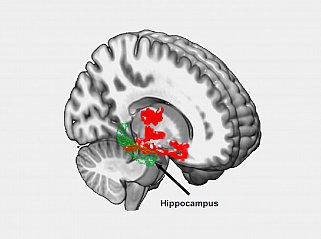A good night's sleep is known to clear the brain of the day's waste. A revealing study shows how one night of sleep deprivation increases Alzheimer's plaque. (Alzheimer's plaque is a brain waste product and the best-known culprit behind Alzheimer's.) See how. Learn what sleep does.
Connecting Alzheimer's plaque to sleep is groundbreaking research. Scientists and philosophers have long wondered why people sleep and how it affects the brain. They know a good night's sleep clears the brain. To unravel sleep's connection to Alzheimer's in the human brain, scientists turned to the latest in new F18 scanning technology.
Article continued below...
What Sleep Does
Sleep is important for storing memories. It also has a restorative function. Lack of sleep impairs reasoning, problem-solving, and attention to detail, among other effects. However, the biochemical mechanisms behind these sleep benefits are just being discovered.In the new NIH study, losing just one night of sleep led to an immediate increase in beta-amyloid, the sticky protein in the brain that clumps up and forms Alzheimer's plaque.
A Study of Humans, Not Mice
The small, new study by researchers at the National Institutes of Health is among the first to demonstrate that sleep may play an important role in human beta-amyloid clearance.While acute sleep deprivation is known to elevate brain beta-amyloid levels in mice, less is known about the impact of sleep deprivation on beta-amyloid accumulation in the human brain.
“This research provides new insight about the potentially harmful effects of a lack of sleep on the brain and has implications for better characterizing the pathology of Alzheimer's disease,” said George F. Koob, Ph.D., director of the National Institute on Alcohol Abuse and Alcoholism (NIAAA), part of the National Institutes of Health, which funded the study.
Beta-amyloid is a metabolic waste product present in the fluid between brain cells. In Alzheimer’s disease, beta-amyloid clumps together to form amyloid plaques, negatively impacting communication between neurons.
The study was led by Drs. Ehsan Shokri-Kojori and Nora D. Volkow of the NIAAA Laboratory of Neuroimaging. Dr. Volkow is also the director of the National Institute on Drug Abuse at NIH.
31 Hours Without Sleep = 5% Difference
To understand the possible link between beta-amyloid accumulation and sleep, the researchers used positron emission tomography (PET) to scan the brains of 20 healthy subjects, ranging in age from 22 to 72, after a night of rested sleep and after sleep deprivation (being awake for about 31 hours).Brain imaging after one night of sleep deprivation revealed beta-amyloid accumulation (red) in the hippocampus and nearby regions. (Proceedings of the National Academy of Sciences)
They found beta-amyloid increases of about 5 percent after losing a night of sleep in brain regions, including the thalamus and hippocampus. These two regions are especially vulnerable to damage in the early stages of Alzheimer’s disease.
To measure beta-amyloid, the researchers used a radiotracer called 18F-florbetaben that has been shown to bind beta-amyloid. Results were published online on April 9, 2018, in the Proceedings of the National Academy of Sciences.
In Alzheimer’s disease, beta-amyloid is estimated to increase about 43 percent in affected individuals relative to healthy older adults. It is unknown whether the increase in beta-amyloid in the study participants would subside after a night of rest.
The More Beta Amyloid, The Worse The Mood
The researchers also found that study participants with larger increases in beta-amyloid reported worse mood after sleep deprivation.“Even though our sample was small, this study demonstrated the negative effect of sleep deprivation on beta-amyloid burden in the human brain. Future studies are needed to assess the generalizability to a larger and more diverse population,” said Dr. Shokri-Kojori.
It is also important to note that the link between sleep disorders and Alzheimer's risk is considered by many scientists to be “bidirectional,” since elevated beta-amyloid may also lead to sleep disturbances.
References: β-Amyloid accumulation in the human brain after one night of sleep deprivation. Shokri-Kojori E, Wang GJ, Wiers CE, Demiral SB, Guo M, Kim SW, Lindgren E, Ramirez V, Zehra A, Freeman C, Miller G, Manza P, Srivastava T, De Santi S, Tomasi D, Benveniste H, Volkow ND. Proc Natl Acad Sci USA. 2018 Apr 9. pii: 201721694. doi: 10.1073/pnas.1721694115. [Epub ahead of print] PMID: 29632177.
Funding: NIH’s National Institute on Alcohol Abuse and Alcoholism (NIAAA).
SOURCE:-
About the National Institutes of Health (NIH):
NIH, the nation's medical research agency, includes 27 Institutes and Centers and is a component of the U.S. Department of Health and Human Services. NIH is the primary federal agency conducting and supporting basic, clinical, and translational medical research, and is investigating the causes, treatments, and cures for both common and rare diseases. For more information about NIH and its programs, visit www.nih.gov.


Comment or Share:
Post a Comment
Your comments (up to 200 words):